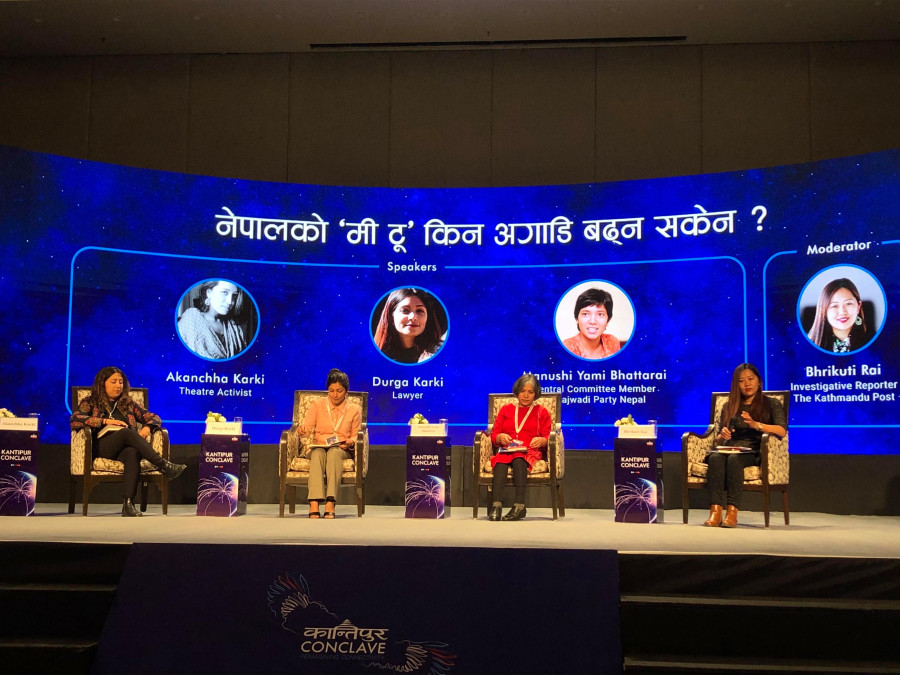National
Why #MeToo movement failed to take off in Nepal
The movement failed to gain momentum due to the established ‘victim-blaming’ trend and a lack of solidarity from the government and organisations, speakers say.
Elisha Shrestha
Although 2019 saw a wave of ’MeToo movement’ in Nepal, a panel navigating the topic ‘Why #metoo movement failed to take off in Nepal’ at the second edition of Kantipur Conclave on Saturday said the movement failed to gain momentum due to the established ‘victim-blaming’ trend and a lack of solidarity from the government and organisations.
The panel discussion featured Akanchha Karki, a theatre activist, Durga Karki, a lawyer, and Manushi Yami Bhattarai, a political activist. The panel was moderated by Bhrikuti Rai.
Read: Less than a year later, Nepal’s men of #MeToo are back to work
Addressing the topic, Akanchha Karki said that rather than showing solidarity and support to the women who have come out with their ‘#MeToo’ stories, they were instead scrutinised and even accused of falsifying their stories.
“Women are often faced with questions of why they didn’t file a complaint about the event at the time it happened instead of speaking about it now. However, people often forget that it takes an immense amount of courage to speak out regarding anything related to sexual activities in a society where sex is still regarded as a taboo,” said Karki.
Read: Why #MeToo never really took off in Nepal
Akanchha Karki said that as soon as the allegations of sexual harassment were made against veteran theatre artists, women and men from the theatre fraternity gathered and held a meeting between 12 victims and the perpetrators.
“Although the perpetrators acknowledged what they did was wrong and apologised to the women in a meeting, women felt mocked and humiliated when the same perpetrators were back to work, without any actions taken against them,” said Karki.
According to her, since the perpetrators were not held accountable for their acts by the organisations that employed them, victims felt shamed and those who were planning to come out with their stories were also discouraged.
Durga Karki said that many people who knew those who were sexual predators and who are still sexual predators also kept mum about it since they didn’t want to jeopardise the personal and business relationships with them.
“Where there is sexual harassment, it is like an open secret. However, no one dares to address the elephant in the room, which perpetuates the sexual misconduct by men in powerful positions,” said Durga Karki.
Read: Fed up by harassment, Nepali women are going online to share their #MeToo stories
Bhattarai elaborated that since the government has never regarded women’s issues as political, #MeToo movement wasn’t addressed by government officials. As a result, there is a lack of legal mechanism that addresses sexual harassment.
“The incidents of sexual violence and misconduct cannot be stopped without collective efforts of individuals, the government and organisations and for that there should be an institutional mechanism to address the grievances of sexual harassment,” said Bhattarai.
Moderator Rai said that the objective of #MeToo movement is to make society free of sexual violence by starting a free dialogue on sex and consent.
Read: Tribhuvan University lecturer sexually harassed female students for years
“#MeToo stories are the tools that have made people aware of the sexual harassments that were hidden or silenced. We have to talk about sex and consent simultaneously to lead the #MeToo movement in the right direction,” said Rai.
The panellists said that #MeToo movement is here to stay although it may take time to bring about a change in attitude among people and to create a society free of sexual misconduct. “Achieving a sexual misconduct-free society may be a slow and long journey but we won’t stop communicating about it,” said Akanchha Karki.
Read Related Stories:-




 16.12°C Kathmandu
16.12°C Kathmandu (1).jpg)














